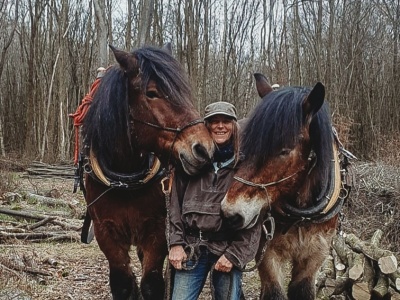
Herbs, History and Horses - a guide to low impact woodland restoration
- Ashford, Kent
- 24 Apr 2025
28 Jul 2022

The 28th July is World Nature Conservation Day, and this year the theme is ‘Forests and Livelihoods: Sustaining People and Planet.’ Forests and woodland are vital habitats for a huge diversity of plants and animals, and they’re also important in their capacity as carbon sinks – absorbing CO2 from the atmosphere and therefore helping in our fight against climate change.
Nature conservation is at the heart of our work here at Small Woods. Managed woodlands have far greater biodiversity, ensuring the needs of native species are met, and woodlands can even be managed with specific species in mind to provide vital habitats for endangered flora, fauna and fungi.
As well as its environmental and ecological importance, woodland management also provides social and economic benefits, such as improved usability and the production of woodland products. Our team at Coed Lleol – Small Woods Wales are working to use nature and woodlands to help improve the health and wellbeing of people across Wales, and our woodland wellbeing sessions help people create a connection with nature, making them more likely to fight to protect it and equipping them with skills and knowledge to help them do so.
What can you do to support global nature conservation?
Nature conservation can feel like an enormous task, and sometimes it can seem like there’s nothing you can do to make a difference – but that’s not the case. We need to learn to live with nature, not against it, and even in our modern world there are lots of things that you can do to reduce your impact on the environment and contribute to nature conservation.
1. Check your waste
We’re all familiar with the saying ‘Reduce, Reuse, Recycle,’ but have you ever stopped to think about what it means? There’s a reason the words are in that order – rather than relying on recycling our waste, it is better to limit the waste that we produce, as recycling is itself a costly process, both economically and environmentally. Simple actions like using a reusable water bottle to cut down on plastic waste can make a big difference – and if you want to make more of an impact, why not look for places where you can shop packaging free?
2. Get handy
What do you do if you get a hole in your favourite trousers? You might be tempted to throw them away and get some new ones, but if you learn some simple sewing skills, you can save your trousers – and some cash, and prevent them from going to landfill. The same goes with almost anything – woodwork, upholstery and even electronic devices. You don’t have to become a super-mender, but learning one or two of these simple skills can help you to reduce your waste and minimise your environmental footprint.
3. Reduce your digital footprint
Most people don’t think of the internet as being bad for the environment, but all of that data has to be stored somewhere, and it takes a huge amount of energy to power the massive data centres that support the global internet. To reduce your e-waste, think about deleting unwanted files that are stored on the cloud, such as photos or old emails that you no longer need.
4. Take action and get your hands dirty
If you want to take nature conservation into your hands and make a direct impact, why not consider volunteering? Almost every managed nature spot and reserve in the UK is reliant on volunteers to help with the running and maintenance of the site, so why not get in touch with one near you and see what you can do to help out. We’re always keen for volunteers to support our work at our headquarters at the Greenwood Centre, so if you’re interested in getting involved, do get in touch!
5. Educate yourself and others
‘Knowledge is power,’ as they say, and learning about nature and the environment can make you better equipped to help protect it. Sharing your knowledge and encouraging others to learn is also really valuable, as the more people that care about nature, the better chance we have of protecting it.
If you’re looking for a place to learn about nature, why not consider joining our online course which will be run in partnership with the RSPB? Throughout the course you’ll hear from experts at the RSPB and will be trained in identifying plants and wildlife and the importance of species to local ecology. Detailed information about this course hasn’t been released just yet, but check our website page or contact our Online Programmes and Training Project Officer for more info on how to take part in this or our other courses. You could also have a look at our digital nature resources and YouTube channel for more information on woodland management and nature in general.
We hope you find some of these tips useful; follow us on Facebook, Instagram and Twitter to find out more things you can do to reduce your environmental impact and support nature conservation.